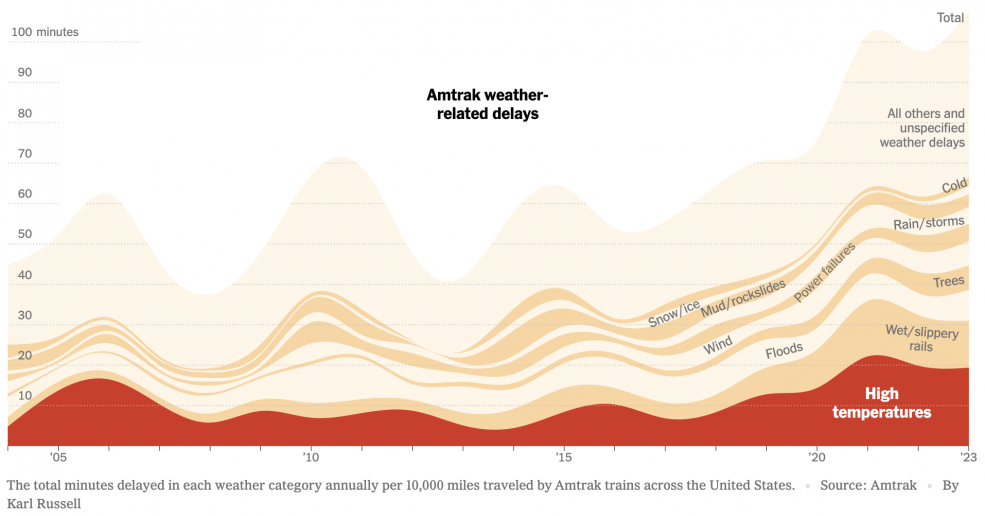Happening Now
Data Show Heat Delays Really Are Increasing
July 19, 2024
By Jim Mathews / President & CEO
If you’ve had a creeping sense that your summer train rides have had more problems than they used to...you’re right. A New York Times analysis published this week showed definitively that weather-related delays throughout Amtrak’s network have ballooned in the past 20 years, and were up especially sharply beginning in 2018.
Extreme weather events hit record levels at Amtrak during Fiscal 2023, the Times reported.
“The biggest contributor has been intensifying heat waves,” the story said. “About 30 percent of trains that arrived late in the 2023 fiscal year were delayed for heat reasons, accounting for nearly 1,200 hours of overall delays. Heat delays more than doubled from the 2018 fiscal year, when Amtrak passengers spent 530 additional hours in trains after high temperatures slowed down rail travel.”
Service meltdowns in the Northeast Corridor during the most recent round of heat waves have grabbed a lot of headlines, even though officially the worst service disruptions from a few weeks ago were, strictly speaking, mechanical and electrical problem that can’t directly be blamed on heat. But heat issues have figured into a lot of problems nationwide, including the situation on the Adirondack which, for yet another summer, has led to 10-mile-an-hour heat orders for territory north of Rouses Point, N.Y., on the way to Montreal.

The Times’ reporter, Minho Kim, did a remarkable job on this story, using the Freedom of Information Act to obtain more than 313,000 separate records on weather-related train delays. The records are based on conductors’ reports on reasons for delays on their trains. Kim then wrote a script using the Python computer programming language to analyze all those records.
Python scripts are typically used to automate boring, repetitive tasks, such as data analysis, giving the computer a clear, detailed set of instructions to complete a task for you, making things faster and easier. In this instance, he was able to cull through all 313,000 records to categorize delays by cause and count the frequencies of those delays by category.
Interestingly, Kim told me that ice and snow and cold temperatures are no longer major contributors to train delays in the Northeast Corridor as they once were, potentially reflecting the Northeast’s warmer winters generally.
And while heat has everyone’s attention in the dog days of July, Kim also found by examining Amtrak’s data that other kinds of extreme weather events – tornadoes, lightning strikes, floods, and so forth – have also spiked in recent years.
We’ve included a free link to the story. Take a look.
"We would not be in the position we’re in if it weren’t for the advocacy of so many of you, over a long period of time, who have believed in passenger rail, and believe that passenger rail should really be a part of America’s intermodal transportation system."
Secretary Ray LaHood, U.S. Department of Transportation
2011 Spring Council Meeting
Comments